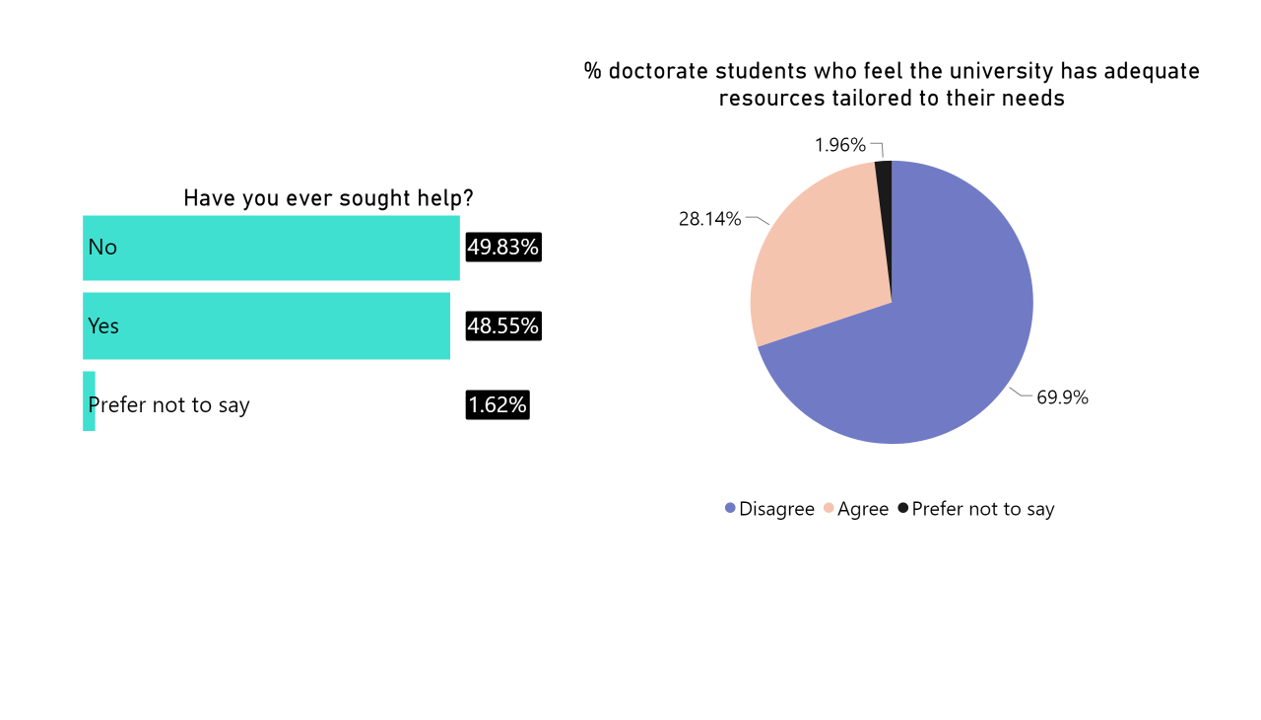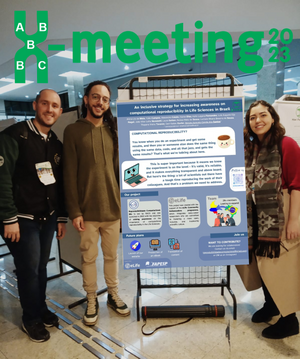Graduate school can be overwhelming and students often consider quitting midway. It is common to feel stressed, both physically and mentally. As grad students, we have the tendency to ignore the needs of our body and mind, and to overcommit. A worldwide survey study of over 6000 PhD students in 2019 performed by Nature revealed that the top four concerns of students are work-life balance, impostor syndrome, mental health, and conflicts with advisors, with the latter two being chosen as the top two concerns by 50% of students (Figure 1, left). The next biggest concerns were impostor syndrome and advisor conflicts, with 18% and 17% of students choosing this as their top concern. In addition, based on this survey about 47% of grad students spend 50+ hours in the lab per week (Figure 1, right), yet their mental health is not even a conversation starter.

Mental health is a multi-faceted construct enveloping our wellbeing, which directly impacts our everyday functioning. Having good mental wellbeing is crucial to having good physical health and being productive. According to Medline, “Mental Health affects how we think, feel, and act as we cope with life. It also helps determine how we handle stress, relate to others, and make choices”. So what happens when a grad student overcommits and spends 50+ hours at work, not giving themselves enough time to take care of their physical, emotional, and social well-being? This can easily set off a chain of psychological issues such as impostor syndrome and low self-esteem, which can cause one to isolate or feel lonely.
One of the questions in the Nature survey asked if students sought help for mental health. Surprisingly, 60% said they did not seek any help for their anxiety and depression (Figure 2, left). Almost half of the group said they did not receive any help from their institute and 70% of them believed that their institute did not provide any tailored or appropriate needs for mental health services catered towards graduate students (Figure 2, right).

So what could a graduate student do to avoid overcommitment and prioritize their mental health? The first step in dealing with these issues is recognizing what overcommitment looks like. It's not that one is lazy or inefficient. It's a realization that 50+ hours in the lab to get your work done at the cost of your social/personal life, or any other outlet, is going to impact one's life negatively in the long run. Below, we have outlined some of the steps that have truly helped us reach a more balanced grad school journey.
- Mindfulness - take a moment for yourself and just breathe. Declutter your mind of unwanted thoughts that cause you to panic or feel anxious and think of how worthwhile these thoughts really are in the long run. Writing down your thoughts or journaling is another great way to decompress.
- Practice thinking, prioritizing, and executing - A well-thought-out plan never fails. When lost and confused, always take a break, shut off from everything and just think. Think about what is important to you. Prioritize and make a list, either mentally or with the use of apps like Trello, to manage all your projects and daily tasks. If you feel you may be forgetting something, you can always ask your Siri or Google Assistant to remind you, or jot it down on a post-it note and place it in a visible spot.
- Delegate - If you are a senior graduate student in the lab, consider delegating some tasks to more junior trainees or undergrads if their schedule permits. This can give them a valuable opportunity to learn and manage tasks and leadership roles in the lab, while also allowing you to focus on other tasks and gain an important skill in resource and time management.
- Learn to ask for help - As graduate students, we are trained to figure out everything by ourselves on our journey to becoming independent researchers. In that process, our mind becomes hardwired to avoid seeking help. But humans are gregarious and are not meant to survive alone. Others around you are often very willing to help but might not know you need it unless you ask. If you feel you lack the courage, then practice in front of a mirror. Start with your immediate friends or relatives. There is no shame in seeking help. Sometimes just talking with your advisor and letting them openly know you’re feeling overwhelmed could resolve conflict and make you feel better about your day-to-day tasks.
- Establish boundaries on your time – It is important to take time for yourself and take well-needed breaks from work every once in a while. To make sure you actively take time for yourself, create schedules or appointments with yourself. Also having some new habits will be beneficial. For example, make it a strict habit to leave the lab by a certain time, or not to check emails after a certain hour. Put a limit on the amount of time you spend working on weekends. Emergencies and exceptions will arise, but you want to be selective about what you consider an emergency. These small habits of self-care will ensure you have plenty of time to wind down and give your mind a rest. It is also a great idea to establish a schedule of weekly/monthly self-introspection to give yourself space. Just like you have lab meetings every week, set up a calendar with meetings with yourself. You could start with a monthly meeting and then work towards a weekly meeting depending on your needs. Checking in with yourself in this way can help you become more critically aware of your mental and physical health needs.
- Practice saying no - When you feel stressed and don’t feel like doing anything, that is completely okay and normal. It is completely fine if you say ‘no’ to others who are demanding too much and/or for something that is not in your best interest. This goes hand in hand with establishing your boundaries with the goal of creating a joyful work experience for yourself.
- How to approach a counselor - If you feel that you have done everything you can but are still struggling at work, then seek help. If you are unsure how to approach a counselor then there are several blogs and articles you can find on the topic. Here is one of them. https://positivepsychology.com/popular-counseling-approaches/. Another useful helpline when you are having thoughts of self-harm is the National Suicide Prevention Helpline (800-273-8255).
The important thing to remember is that you are not alone. Isolating and withdrawing yourself is not the solution. Reach out to your fellow grad students, as they may be going through similar experiences. Following some of these guidelines can make grad school a truly enriching experience rather than a burden to bear.
Cover image by Tim Gouw on Unsplash
About the authors:
Karishma Gangwani is a Biologist at the University of Dayton. She is also an artist who applies creativity to data driven insights. Connect with Karishma on Twitter.
Aishwarya Kothari is a Plant Geneticist at Montana State University. Follow Aishwarya on Twitter.
We welcome comments, questions and feedback. Please contact us at ecrlife [dot] editors [at] gmail [dot] com.
Would you like to share your own story, insight or opinion? Pitch us here.
Follow us on Twitter or LinkedIn to stay up to speed with our latest news and blog post releases.







